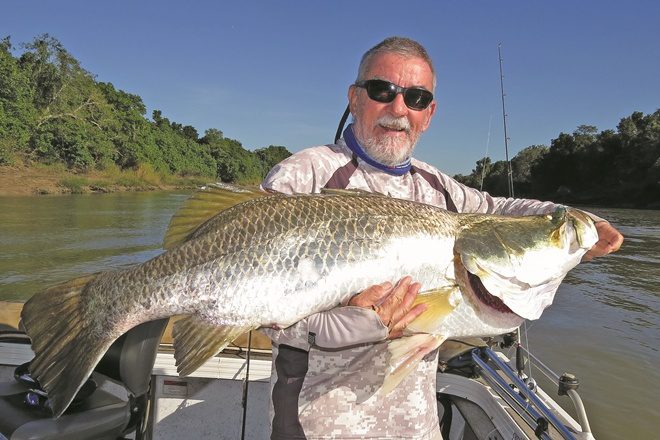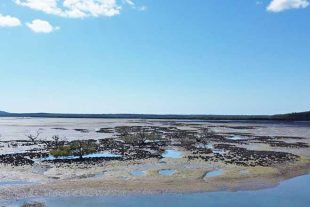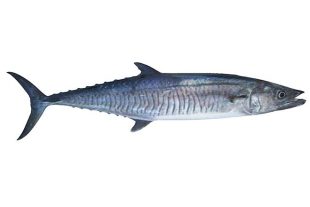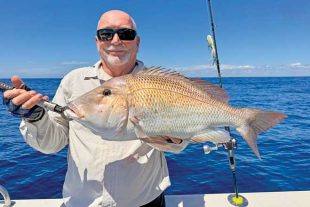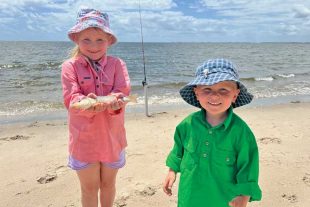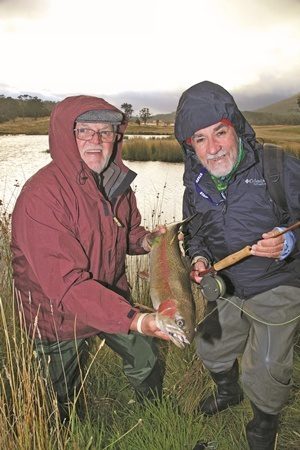
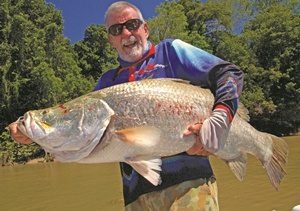
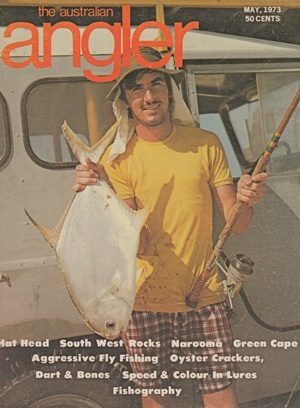
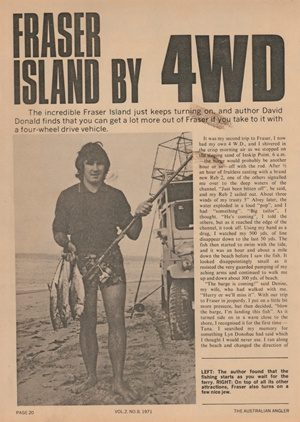
MY old friend and lifetime fisho the late Ron ‘Demo’ Dempster loved Rubáiyát of Omar Khayyám and gifted a copy of this wonderful book to me, which I have treasured since. Its message is very clear – we’re only on this earth for a short while, so we must make the most of every day! Dave Donald
It certainly doesn’t feel like 50 years since my first magazine article was published in the Australian Angler in 1971! I was as proud as punch that my contribution titled ‘Fraser Island by 4WD’ had been accepted by the legendary editor the late Ron Calcutt, as his magazine was leading the way in the ‘new’ sportfishing movement that spread like wildfire throughout the country.
They were heady days indeed, with almost every issue featuring fresh techniques or adventures that were changing the way Aussie fishers approached their pastime. Perhaps a quote from that article would put those days in perspective:
My first visit to Fraser early this year in an old FJ Holden was enough to convince me to trade in my Mini Cooper S on a 1963 Toyota Landcruiser. Since then, almost all of my trips have been at weekends, usually once a month when the tide allows maximum fishing time on the Island.Dave Donald
In those days, it was a five-hour drive to the ferry crossing at Inskip Point from my home in Ipswich. Having cut my fishing teeth casting Alveys for whiting, bream, flathead and tailor, I joined the newly formed Brisbane Sportfishing Club and was suddenly hearing whispers about mysterious species such as mangrove jack, bass and tuna.
There was a fishing world out there ready to be explored and tested that I hardly knew existed. No better way to enhance my passion than to share my experiences with other fishers by writing about them. So here I am, five decades later still fishing and scribbling away after sharing my writing skills through a career that included work as a medical laboratory technician, tackle shop owner – twice – boat sales and brokerage, and several stints as a charter operator and guide.
The last 30 years I’ve been living in God’s own country, based in Northern Peninsula Area for the initial seven and then as a Weipa resident for most of the other 23. During those years, I’ve had hundreds of articles published in just about every Aussie fishing and adventure magazine and a few others, as well as appearing in a heap of video and TV productions.Dave Donald
If I had to single out a couple of my most memorable articles, ‘From Culm to Cast’ in FishLife magazine in 2017 – where I documented building a split cane fly rod from scratch under the eye of master craftsman Nick Taransky – was one of the most satisfying projects of my life, and an Inside Sport feature on our own Kim Bain-Moore, the first Aussie male or female ever to make the US Bassmasters finals, certainly come very quickly to mind.
What’s also interesting is that Inside Sport paid more than double for that story than any other publication I’ve dealt with! Which brings me to the rather tricky subject of writer payment and sponsorship – editor Ben, I’m being candid here, not suggesting a raise. While Australia’s tackle industry generates an estimated $2 billion plus in sales every year, our turnover is small biccies in comparison to the enormous US market and major tackle companies.Dave Donald
What this means in real terms is that few fishing writers or celebrities are able to make a living from full-time writing and promoting their sport in our country as the industry dollars, based on how many people are going fishing and using their products, are just not there.
The recent shift to digital technology and subsequent harvesting of advertising by the global tech companies have exacerbated that equation even more. So, when you consider that way back in the 1970s I was being paid better than a week’s wages for an article published in the Australian Angler, that’s definitely not the case in these ‘enlightened’ times.
Sure, we’ve had writers and communicators – Steve ‘Starlo’ Starling, Andrew ‘ET’ Ettingshausen, Rex Hunt and my good friend Warren Steptoe – manage to make a buck or two, but it’s hard going scratching around for dollars in our relatively small market.Dave Donald
To illustrate how the other half lives, US fly fishing writer John Gerach – hardly a well-known name outside of his fraternity – made enough from a column that was printed in a couple of major newspapers each week to live and fish extensively as a full-time occupation for decades.
US pro tournament fishers such as our own Carl Jocumsen routinely have sponsors lining up to furnish them with everything from vehicles and boats to tackle and electronics when they make a name on the circuit. Recreational fishing is an enormous industry over there.
But, there’s more to writing than mere dollars – reminiscing and sharing personal experiences has always been my primary motivation.
Over the years, recreational fishing has largely changed its focus from kill and grill to a much more responsible limit your catch attitude and that transition has been largely due to writers and TV programs promoting a more responsible and ethical approach to their fishing activities.Dave Donald
Rex, Starlo and Kaj ‘Bushy’ Busch took the message wholesale to our screens but similar to myself many regular writers have been chipping away at this theme for a long time. It’s all very well to be altruistic but when you have a family to support the dollars have to come from somewhere. After selling my tackle shop in Yeppoon in 1981, I decided to start a guided fishing business, but it wasn’t the time or the place.
However, the lessons learned eventually allowed to me combine my writing skills with my day-to-day occupation, that of a fishing guide at Cape York Wilderness Lodge at the tip of the Cape.
By the time I resettled my family in Weipa seven years later, my pioneering efforts and experience in northern Australian fishing tours came together to consolidate into a viable business venture that included a wonderful remote lifestyle and provided numerous ingredients for my magazine articles.
One of the many lessons learned concerned business promotion via fishing writers. While my articles and columns featured mostly business-related events, the coverage given by visiting journalists definitely provides a more credible and independent view of your operation. In the early days, it was usual for tourism departments to send all sorts our way.Dave Donald
After experiencing several journos who were only there for the junket, I quickly learned to pick and choose my visitors – writers who knew the ropes and submitted to the best magazines. In that way, our business got value for money rather than giving away a freebie. I’ve met quite a few fishers over the years who’ve sought advice on becoming fishing writers.
If you’re in that category, the following tips may assist. For a start, read widely from novels and historical books rather than the usual dribble on social media. Writing well requires a good vocabulary as well as being able to draw on a variety of literature styles. In these days of spellchecks and other editing tools, it’s still important to be familiar with punctuation and presentation.
Perhaps the most helpful subject in developing my writing was during my Queensland University of Technology days – a supplementary course titled ‘English Expression’. A correspondence course in journalism also provided the skills needed to differentiate a magazine submission from a news article. Anything you personally write or submit for publication becomes your copyright and cannot legally be used without your permission.Dave Donald
It is important that any terms of use are negotiated with the editor before publication. The digital age has unfortunately made the plagiarising of material and photos much less manageable these days but should be something aspiring writers and photographers are well aware of. Well, writing has been a large part of my journey as a passionate fisher.
If I’ve helped or brought enjoyment to a few of you then my efforts have been worthwhile. Perhaps words from my feature, ‘A Day at the Office’ published in Modern Fishing in April 1993 is a pertinent endpiece.
“Here’s the man with the world’s best job!” I’ve lost count of the number of times clients have greeted me this way. For many, the salutation is genuinely believed, their judgement no doubt influenced by the healthy voyeurism provided by the ‘Penthouses’ of the fishing press… However, the truth must eventually be told and who better to pen the ‘confessions of a fishing guide’ than a well-credentialled bloke like myself!Dave Donald
 Bush ‘n Beach Fishing Magazine Location reports & tips for fishing, boating, camping, kayaking, 4WDing in Queensland and Northern NSW
Bush ‘n Beach Fishing Magazine Location reports & tips for fishing, boating, camping, kayaking, 4WDing in Queensland and Northern NSW

